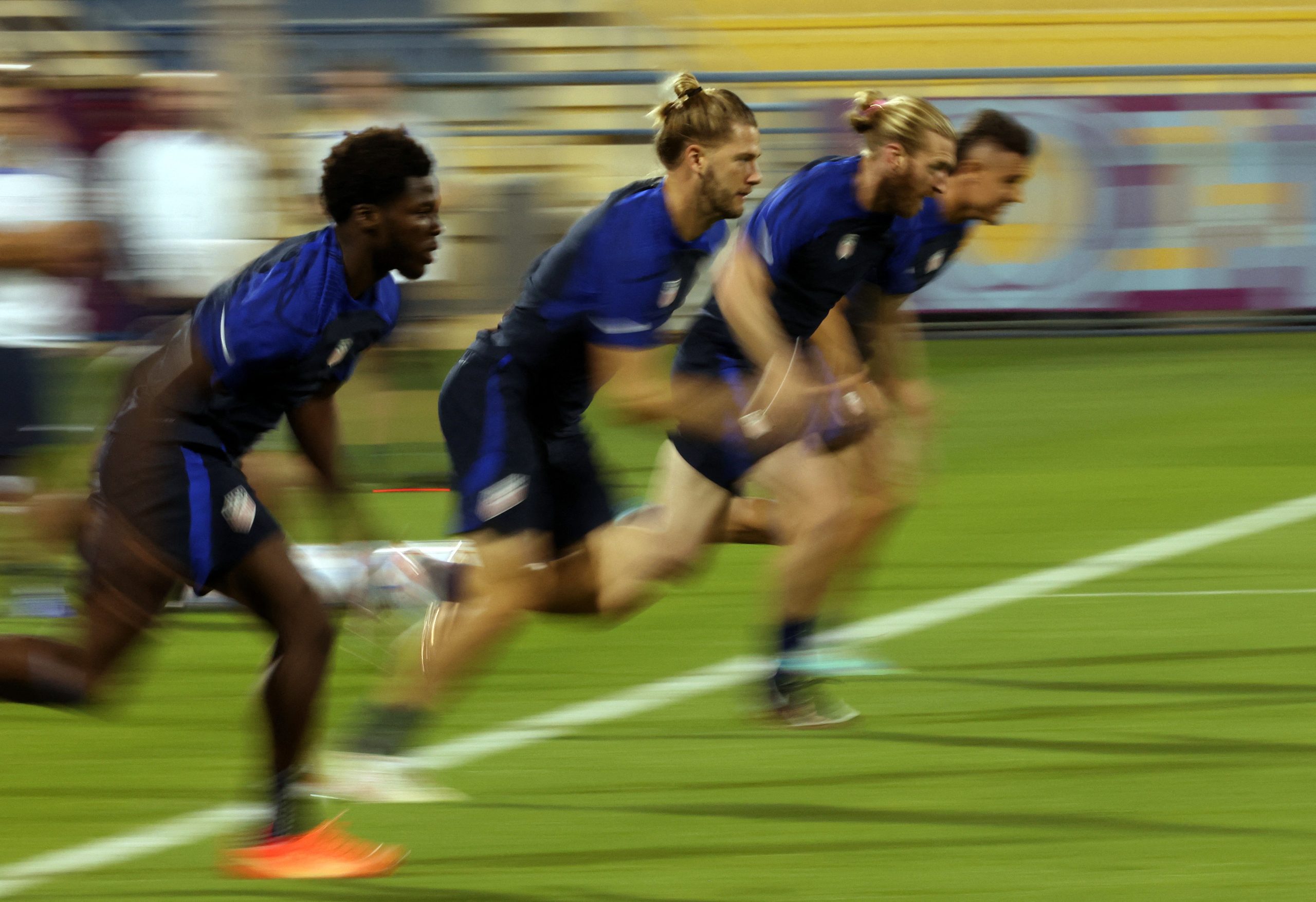
[elfsight_social_share_buttons id=”1″]
Diplomatic foes the United States and Iran face off on the pitch at the World Cup on Tuesday in a match that some Iranians fear may see further run-ins with stadium security or clashes with pro-government fans over raging protests back home.
The contest between the two nations that severed ties over 40 years ago will be held with increased security to prevent a flare-up of tensions over the unrest that has gripped Iran since the death of 22-year-old Mahsa Amini on Sept. 16 while she was in government custody.
In a show of solidarity ahead of the match, which starts at 2 p.m. ET, the U.S. Soccer Federation temporarily displayed Iran’s national flag without the emblem of the Islamic Republic, leading Tehran to complain to FIFA, according to state media.
The official Twitter account of the US national football (soccer) team (@USMNT) has removed the Islamic Republic's "Allah" emblem and the "takbirs" from Iran's three-colored flag in a picture it has posted of their FIFA World Cup group's standings ahead of Iran-US Tuesday match. pic.twitter.com/cQgBepEiPN
— Iran International English (@IranIntl_En) November 26, 2022
Qatar, which has strong ties with Washington and friendly relations with Tehran, has staked its reputation on delivering a smooth World Cup, beefing up security at Iran games and banning some items deemed inflammatory, like Iran’s pre-Revolution flag.
Iran’s top nuclear negotiator Ali Bagheri Kani arrived in Doha on Tuesday on an invitation from Qatar, state news agency IRNA reported without mentioning if he would attend the match.
U.S.-Iranian ties have been especially strained since then-President Donald Trump abandoned Tehran’s nuclear deal with world powers. Efforts to salvage the pact under President Joe Biden’s administration have stalled.
Politics have spilled into the World Cup, the first to be held in a Middle East country.
Security teams deployed on Friday when Iran beat Wales to “break up a small number of altercations” between Iranian fans outside the stadium, a Qatari official said, adding the incidents were handled “swiftly” to contain tensions.
“I will not attend the game on Tuesday since I do not feel safe in Qatar,” said Iranian-Canadian Azi, declining to give her last name and who was wearing a T-shirt declaring ‘Women, Life, Freedom’ — a slogan of the Iran protests.
“Qatar is conducting the same censorship system as what is going on in Iran … Also FIFA is to take the blame,” she told Reuters about being stopped by stadium security for her attire.
Hila Yadegar, 37, plans to be at the match to show support for protesters even though she and her husband were both briefly held by stadium guards at the Iran-Wales match and despite voicing similar unease over security in Qatar.
“I put a chair behind our room in the hotel even though it was locked,” said Yadegar, who works in a hospital in Canada.
Iran team faces pressure
The Qatar official, when asked about security concerns and complaints over restrictions, said authorities would ensure all matches are “safe and welcoming for all spectators”.
Items that “could increase tensions and risk the safety of fans” would not be permitted at stadiums, the official said.
Gulf Arab monarchies, including Qatar, do not tolerate domestic dissent and protests are rare in the region.
Under pressure to publicly support protesters at home, the Iran team declined to sing the national anthem in their first game against England, which they lost 6-2. But they sang the anthem ahead of their second match, a 2-0 win over Wales.
After Friday’s victory, an Iranian fan in a T-shirt with an image of Supreme Leader Ayatollah Ali Khamenei and Qassem Soleimani – a top Iranian general killed by a U.S. drone strike in 2020 — chanted over fans voicing support for protesters.
The unrest in Iran poses one of the boldest challenges to the theocracy since the 1979 Islamic Revolution. Washington has imposed sanctions on Iranian officials over the deadly crackdown on protests.
The United States and Iran severed formal relations in 1980 after the Revolution and ties were hostile when their soccer teams clashed in the 1998 World Cup. Iran emerged with a 2-1 victory in a game dubbed the “mother of all football matches.”
Copyright 2022 Thomson/Reuters
